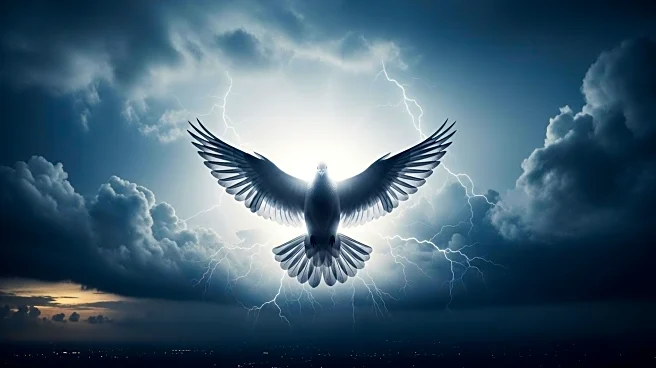What's Happening?
Ukrainian President Volodymyr Zelenskyy has criticized Western countries for their lack of a strong response to Russia's intensified bombing campaign against Ukraine. This criticism follows a significant attack on the city of Lviv, which resulted in the deaths of six people and injuries to 18 others. The attack, which involved Russian Shahed drones and missiles, targeted the city for five hours, causing large explosions and significant damage to civilian infrastructure, including a school, kindergarten, and church. Zelenskyy accused Russia of deliberately targeting Ukraine's gas and energy systems ahead of winter and called for stronger export controls on components used in the attacks, which reportedly include parts from Western countries. He also urged Ukraine's allies to enhance air defenses and consider imposing a no-fly zone, a measure they have been hesitant to implement.
Why It's Important?
The ongoing conflict in Ukraine and the recent escalation in attacks highlight the geopolitical tensions between Russia and Western nations. Zelenskyy's call for a more robust response from the West underscores the pressure on Western governments to take decisive action in support of Ukraine. The use of Western components in Russian attacks raises concerns about the effectiveness of current export controls and the need for stricter regulations. The situation also poses a significant humanitarian challenge, as the destruction of energy infrastructure could lead to severe hardships for Ukrainian civilians during the winter months. The international community's response to these developments could influence the future dynamics of the conflict and the broader geopolitical landscape.
What's Next?
As the conflict continues, Ukraine is likely to seek further military and diplomatic support from its allies. The potential for increased Western involvement, such as enhanced air defenses or the imposition of a no-fly zone, remains uncertain but could significantly impact the course of the conflict. Additionally, the international community may face increased pressure to address the humanitarian needs of Ukrainian civilians affected by the ongoing attacks. The situation also raises questions about the future of export controls and the role of Western countries in preventing the use of their technology in conflicts.
Beyond the Headlines
The conflict in Ukraine has broader implications for international relations and the global balance of power. The use of Western components in Russian military operations highlights the complexities of global supply chains and the challenges of regulating dual-use technologies. The situation also underscores the importance of international cooperation in addressing security threats and supporting countries facing aggression. The ongoing conflict may lead to shifts in alliances and influence future policy decisions regarding military support and export controls.










